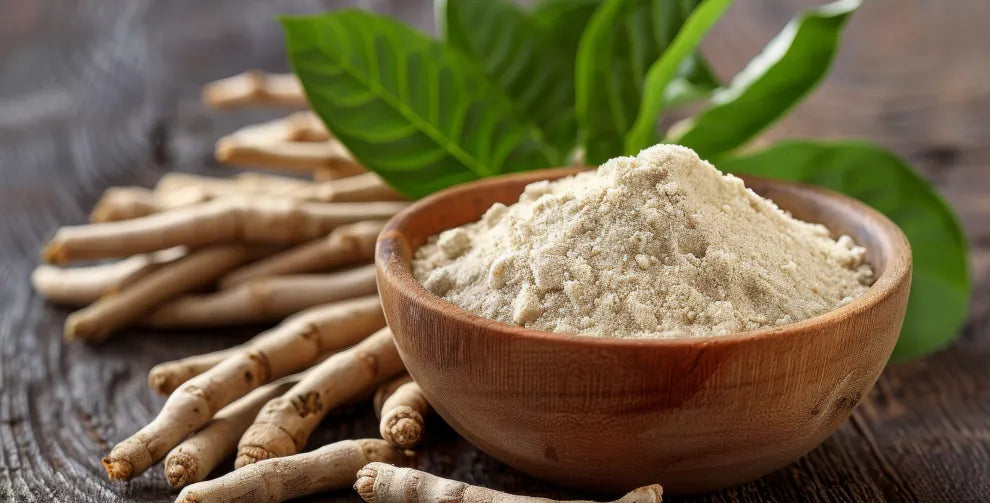Ashwagandha vs. CBD: Differences and similarities
Compare ashwagandha and CBD for stress relief and wellness. Learn their differences and how they can complement your routine.

In the realm of natural wellness, two compounds have garnered significant attention for their potential health benefits: ashwagandha and cannabidiol (CBD). Both are celebrated for their ability to promote relaxation, reduce stress, and support overall well-being.
However, despite these similarities, Ashwagandha and CBD differ in their origins, mechanisms of action, and specific health applications. This article explores the differences and similarities between ashwagandha and CBD, providing a comprehensive understanding of how each can contribute to a holistic health routine.
What is ashwagandha?
Ashwagandha, scientifically known as Withania somnifera, is an ancient medicinal herb widely used in Ayurvedic medicine, a traditional system of medicine in India.
Often referred to as "Indian ginseng" or "winter cherry," ashwagandha is classified as an adaptogen — a natural substance believed to help the body adapt to stress and maintain homeostasis.
How does ashwagandha work?
Ashwagandha contains active compounds called withanolides, which are believed to exert therapeutic effects. These compounds help modulate the body's stress response by interacting with the hypothalamic-pituitary-adrenal (HPA) axis, which regulates cortisol levels.
By supporting healthy levels of cortisol, ashwagandha may reduce feelings of stress and promote a sense of calm.
What is CBD?
Cannabidiol (CBD) is one of over a hundred cannabinoids found in the cannabis plant, particularly in Cannabis sativa varieties.
Unlike tetrahydrocannabinol (THC), CBD is non-psychoactive, meaning it does not produce the "high" associated with cannabis use. CBD has gained popularity for its potential therapeutic benefits, including soothing, tension-relieving, and cognitive-supporting properties.
How does CBD work?
CBD interacts with the body’s endocannabinoid system (ECS), a complex network of receptors, enzymes, and endocannabinoids that regulate various physiological processes such as mood, pain sensation, and immune function.
Specifically, CBD influences the ECS by interacting with cannabinoid receptors (CB1 and CB2) and other receptor systems, such as serotonin receptors, which play a significant role in mood regulation.
How do ashwagandha and CBD compare?
Despite their different origins and chemical structures, ashwagandha and CBD share several similarities that make them appealing options for those seeking natural remedies for feelings of stress and tension.
1. Ashwagandha and CBD for stress and balance
Both ashwagandha and CBD are renowned for their ability to ease feelings of stress. Ashwagandha achieves this by supporting balanced cortisol levels, thereby mitigating the body's stress response. Similarly, CBD interacts with serotonin receptors to promote a sense of calm and relaxation, helping to alleviate feelings of overwhelm.
Ashwagandha is classified as an adaptogen, a substance that helps the body adapt to stress and maintain homeostasis. While CBD is not traditionally classified as an adaptogen, its ability to modulate the ECS and influence stress-related pathways suggests it may share similar adaptogenic qualities.
2. Ashwagandha and CBD for daily relief
Both compounds have soothing properties. Ashwagandha's withanolides help soothe tension and irritation by supporting healthy immune responses, while CBD directly interacts with the ECS to have soothing effects. This makes both ashwagandha and CBD potentially beneficial for times of tension.
3. Ashwagandha and CBD for cognitive support
Ashwagandha and CBD both offer potential benefits for cognitive support. Ashwagandha supports brain health by supporting cells during exposure to oxidative stress and promoting the growth of nerve cells. CBD, on the other hand, may help support overall neuron health and brain health through its interaction with the ECS.
How are ashwagandha and CBD different?
While ashwagandha and CBD share several benefits, they differ significantly in their origins, chemical compositions, and specific applications.
1. Origin and classification
Ashwagandha is an herbal supplement derived from the roots and berries of the Withania somnifera plant. It has been used for centuries in Ayurvedic medicine for its wide-ranging health benefits.
CBD is a cannabinoid extracted from the flowers, leaves, and stalks of the cannabis plant, particularly from hemp varieties of Cannabis sativa. It is a relatively recent addition to the wellness market compared to Ashwagandha.
2. Chemical structure and mechanism of action
Ashwagandha contains withanolides, which are steroidal lactones that exert their effects by modulating the HPA axis and reducing cortisol levels.
CBD is a cannabinoid that interacts primarily with the ECS, influencing cannabinoid receptors (CB1 and CB2) and serotonin receptors to produce its effects.
3. Specific health applications
Ashwagandha is primarily used for tension reduction, sleep quality, enhancing physical performance, and supporting thyroid function. It is also explored for its potential benefits in supporting fertility and emotional balance.
CBD is widely used for managing tension, discomfort, and sleep quality. It's also being studied for its ability to support overall emotional wellness.
The bottom line
Ashwagandha and CBD are two powerful natural compounds that offer significant benefits for managing tension and promoting overall well-being.
While they share similarities in their ability to reduce tension, they differ in their origins, chemical structures, and specific health applications. Ashwagandha, an ancient herb rooted in Ayurvedic medicine, primarily acts as an adaptogen to balance cortisol levels and support the body's stress response. In contrast, CBD, a cannabinoid from the cannabis plant, interacts with the endocannabinoid system — which helps regulate mood, pain, and inflammatory processes.
If you’re interested in incorporating ashwagandha or CBD into your wellness routine, aim to prioritize high-quality products, consult your healthcare provider, and start with low amounts to determine what works best for your goals.
*This statement has not been evaluated by the Food and Drug Administration. This product is not intended to diagnose, treat, cure, or prevent any disease.
Sources:
Ashwagandha Usefulness and Safety | NIH
Cannabidiol (CBD): What we know and what we don't | Harvard Health
Ashwagandha: Is it helpful for stress, anxiety, or sleep? | Health Professional Fact Sheet













